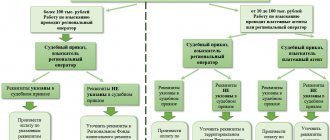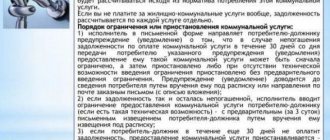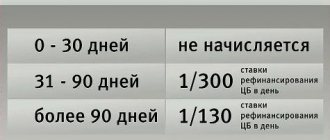Legal basis
You can often come across the opinion that housing departments do not have the right to fine non-payers, because the management company is not a court. Or this: only those who completely ignore incoming bills are subject to penalties. They say that if you pay at least some part of the fee, this will save you from fines.
Both of these statements are incorrect. The legality of accruing additional amounts is confirmed by the housing legislation of the Russian Federation (Article 155 of the Housing Code). This applies to residents who completely ignore their financial responsibilities, and to those who underpay (Article 153 of the Housing Code; Decree of the Government of the Russian Federation No. 354, Rules for the provision of utility services, section VI, clause 66; section XVI, clause 159).
The amount of the penalty directly depends on how many days the account is not repaid (Federal Law No. 307-FZ). Until recently, the tenth day of the month was considered a milestone, and the rate did not change, no matter how long the subscriber delayed fulfilling his obligations. Since November 2015, which is when the aforementioned Federal Law was adopted, the longer the required contribution is not received, the higher the fine. Thus, the additional amount for delay of less than ninety days will be 1/300 of the Central Bank rate. If it’s even one day more, it’s already 1/130 of the bet.
But there are also some nuances here: this figure varies depending on the status of the company. Thus, for homeowners’ associations and housing-construction cooperatives, the penalty is set immediately at 1/130, from the very first day.
Current laws
In accordance with the provisions of the Housing Code of the Russian Federation, owners of residential premises are obliged to maintain the place in which they live. In case of non-compliance with civil obligations regarding payments for utility services, he has the right to impose a penalty.
According to the provisions of the current legislation, the period established for payment of housing and communal services lasts up to 10 months inclusive. A different payment period is established if the management agreement or the general meeting of residents in the partnership or cooperative decided to determine other terms. This norm is provided for in paragraph 1 of Article 155 of the Housing Code of the Russian Federation.
If a citizen evades payments for a long time, then the housing and utility company has the right not only to limit himself to a penalty, but to take drastic measures in the form of turning off the water supply or electricity.
Based on paragraph 14 of Article 155 of the Housing Code of the Russian Federation, the utility company has the opportunity to charge penalties when there is a delay in payment.
This settlement system is applicable if the debtor is an individual, HOA or housing construction cooperative.
If the defaulter is a management or heat supply organization, then the debt is calculated using a penalty calculator under Art. 37 Federal Law “On Electric Power Industry”.
For non-payment of which services a penalty is not charged?
Not all paid services are subject to penalties, even if the client delays payment.
First, you need to know the list of paid resources, services and works that are subject to penalties for missed payment deadlines. This:
- water, hot and cold (including sewerage);
- gas;
- light;
- landscaping and landscaping;
- major repairs;
- maintenance of common property;
- waste removal.
For additional options, such as the work of a concierge, the presence of security systems, you also need to pay, but no penalties are provided.
Legislation
Clause 14 art. 155 of the Housing Code of the Russian Federation.
Article 319 of the Civil Code of the Russian Federation.
Article 317.1 of the Civil Code of the Russian Federation determines the norms and legality of interest for failure to fulfill obligations under an agreement with public utilities.
Article 330 of the Civil Code of the Russian Federation - gives a complete understanding of the concept of “fine”.
Article 332 of the Civil Code of the Russian Federation talks about the legality of penalties and methods of collecting debts.
Clause 159 of the “Rules for the provision of utility services” approved by Government Decree N354 “On the provision of utility services to owners and users.”
Decree of the Government of the Russian Federation of May 23, 2006 N 307 (as amended on December 17, 2014) “On the procedure for providing utilities. On the procedure for providing utility services to citizens.”
This Decree of the Government of the Russian Federation dated May 23, 2006 N 307 determined the procedure for calculating penalties in connection with which astronomical late payment penalties were paid to tenants and owners of residential premises for rent starting from the next day after the established date of the 10th day following the billing month.
Legal ways to avoid fines
To avoid having to spend more, it is better to pay your monthly bills on time. But another question arises: what to do if you have to leave for a long time? After all, logically, if no one used the housing, then there is nothing to charge money for.
This is true, but only applies to gas, water supply, electricity and sewerage. But bills will come for heat and maintenance of common property regardless of whether you were present in the apartment or not. These indicators depend on the area of the apartment, and not on the volume of resource consumed.
In order to avoid overcharges, delays and, as a result, penalties, visit the office of the management organization before departure and submit an application for non-residence. You can also send it by registered mail with notification and a description of the attachment. You have the right to ask for a recalculation even upon returning from a long absence, if you did not manage to do this in advance. But hurry up: you have exactly thirty days.
The validity of your claims will be confirmed by:
- business trip order (copy);
- hotel checks;
- Railway tickets;
- medical documents.
If you have evidence of another reason for long-term absence, please attach it to your application.
Make sure that the request has been accepted, that is, the secretary has registered it, assigned a number to the paper and put a note on acceptance. It is best to make two copies of it and keep one for yourself.
The size of the penalty seems very small, but this impression is deceptive. After all, fines are charged for each day of delay, and not for a month. To avoid unpleasant surprises, do not forget to notify the management organization if the number of resource consumers decreases.
Changes
Penalties for utilities are charged to the owner if he has not made payment on the receipt within 31 days. In this case, the owner of the residential premises is already considered a willful defaulter.
Paragraph 14 of Article 155 of the Housing Code of the Russian Federation establishes that persons who have lately and (or) not fully paid for housing and utilities are required to pay the lender a penalty in the amount of one three hundredth of the refinancing rate of the Central Bank of the Russian Federation, valid on the day of actual payment , from the amount not paid on time for each day of delay, starting from the thirty-first day following the day of the established payment due date, until the day of actual payment made within ninety calendar days from the date of the established payment due date, or until the expiration of ninety calendar days after the day of the due date for payment, if payment is not made within the ninety-day period. Starting from the ninety-first day following the day of the established payment deadline until the day of actual payment, penalties are paid in the amount of one hundred and thirtieth of the refinancing rate of the Central Bank of the Russian Federation, effective on the day of actual payment, of the amount not paid on time for each day of delay. An increase in the amounts of penalties established by this part is not allowed.
The main change that is most important is that the amount of penalties cannot exceed 50% of the total debt. So, if the owner has an outstanding utility bill of 1000 rubles, the management company cannot add a penalty of more than 500 rubles.
A fine equal to half the amount of the debt is possible only if there is systematic failure to pay.
Since 2021, adjustments have been made, and the formation procedure has changed accordingly.
Key points:
- No penalty is charged (accrued) for the first 30 days.
- Penalties are accrued from the 31st day.
- If the delay is more than 2 months, then an additional fee is set in the amount of 1/300 of the refinancing rate of the Central Bank of Russia (equal to the key rate of the Central Bank of the Russian Federation according to instruction No. 389-U dated 11/12/2015).
- Starting from day 91, there is an increase to 1/130 every day.
If the tenant or property owner ignores the debt, then a complete shutdown of services is permitted.
FAQ
Does the housing department have the right to put a cap on the sewer system if it is not yet possible to pay the entire debt with accrued penalties?
The management company does not have the right to completely turn off the water. This is possible only by agreement of the parties (Article 546 of the Civil Code). But limiting the water supply to the maximum is possible by warning you at least twice in advance (Resolution of the Government of the Russian Federation No. 354). If you are not yet able to raise enough money to pay off the entire debt, then apply for restructuring. Explain to the housing department office what happened. Then they will give permission to repay the debt little by little, in portions.
Is it legal to charge penalties for non-payment if the owner has not been home for two months due to a business trip?
Timely notification of the service provider about non-residence is considered the responsibility of the citizen himself. It is the responsibility of the resident directly to submit an application. Then there will be no penalties. If this was not done, then the management company’s demands are completely legal.
Is it possible to cancel a court decision in absentia regarding the payment of debt and penalties at the previous place of residence if this tenant has been living in another place for six months?
A court decision in absentia can be overturned. It should be confirmed that the person lived in another place and paid for accommodation there. Attach all payment documents to the claim, the management company will become the defendant. But a lot depends on what period the dispute is about.
If the claims date back to the time when the person was still living in the previous apartment, then the court’s decision is absolutely legal - the amount will have to be reimbursed, including penalties. In such a situation, it is best to seek qualified legal assistance.
Violation of payment deadlines for consumed utility resources entails the accrual of penalties.
The Civil Code allows the use of interim measures for the parties to fulfill their obligations. This may be a penalty, a pledge, a guarantee, etc. (Clause 1 of Article 329 of the Civil Code of the Russian Federation). The law understands a penalty as a certain amount of money paid by the debtor to his creditor for the delay in his performance. When collecting a penalty, you do not need to prove that the creditor incurred losses.
The Plenum of the Supreme Arbitration Court of the Russian Federation adopted Resolution No. 81 in 2011, which clarified many issues related to the procedure for applying Art. 333 Civil Code of the Russian Federation. Among other things, it states that when filing a claim in court, the creditor must collect evidence of the debtor’s failure to fulfill precisely that obligation, the failure of which entails penalties.
The fact of late payment was confirmed in court. As a result, the judge recognized the requirement to charge a late payment penalty in the amount of 85 thousand rubles as legitimate. The decision was based on the following rules of law.
The right of the municipal unitary enterprise to collect penalties from the management organization for late payment is established in clause 6.4 of Art. 13 of Law No. 416-FZ. Its size depends on the number of days that have passed since the date of payment and the refinancing rate of the Central Bank of the Russian Federation:
- 1/300 of the rate if payment is made within 60 days after the due date;
- 1/170 - within 60–90 days;
- 1/130 - over 90 days.
Penalties are charged on the amount not paid on time.
The text of the legal act does not define what rate the Bank of Russia applies when collecting penalties in court. The court considered that it was necessary to apply the rate in effect at the time the judicial act was issued. Its size was 7.75% per annum. Based on this value, the plaintiff calculated the penalty correctly. The defendant did not provide a counter-calculation.
The management company filed an appeal request to reduce the penalty, but was refused. It was justified as follows.
In one of its rulings in 2000, the Constitutional Court pointed out the need to establish the proportionality of the violation and its consequences, that is, the amount of compensation must be commensurate with the harm caused. The inadequacy of the penalty is expressed in its excessiveness, the length of the period for which it is collected, or the excess of the amount of the penalty over possible losses.
In each case, when the judge decides to reduce the fine under Art. 333 of the Civil Code of the Russian Federation, he must take into account that the debtor during the period of delay unlawfully used money that did not belong to him. Under the law, no one has the right to benefit illegally from their misconduct. A court's reduction of the fine may result in the defendant being given the opportunity to use other people's money on non-market conditions. This may lead to the fact that unscrupulous defaulters will be interested in continuing to violate the obligation to pay the debt on time. Therefore, the court must evaluate the prevailing circumstances of the dispute in each specific case. This is written in detail in the Resolution of the Plenum of the Armed Forces of the Russian Federation No. 7 of March 24, 2021.
The defendant must prove that the penalty is not commensurate with the possible losses. But the management company did not provide the court with objections to the plaintiff’s evidence with references to the relevant legal norms indicating that the defendant was right. Arbitration Procedure Code of the Russian Federation in Art. 70 establishes that if one of the parties substantiates its position with certain circumstances, and the second party does not dispute their existence, then they are considered recognized by it.
Based on the stated position, the court considered that the reduction of the penalty in the situation between the parties had no legal basis.









